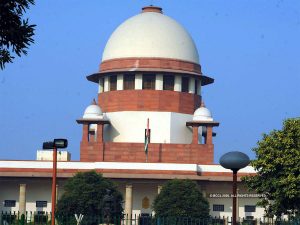Provisions Of 97th Amendment Struck Down: SC:

The Supreme Court (SC) upheld a 2013 judgment of the Gujarat High Court and struck down certain provisions of the Constitution (97th Amendment) Act, 2011.
- It gave a major boost for federalism as the 97th Amendment shrank the exclusive authority of States over its co-operative societies, a sector considered as a massive contributor to the economy.
- Part IXB, introduced into the Constitution through the 97th Amendment, dictated the terms for running co-operative societies.
- The provisions in the Amendment, passed by Parliament without getting them ratified by State legislatures as required by the Constitution.
- It went to the extent of determining the number of directors a society should have or their length of tenure and even the necessary expertise required to become a member of the society.
- The word “cooperatives” was added after “unions and associations” in Article 19(1)(c) under Part III of the Constitution. This enables all the citizens to form cooperatives by giving it the status of fundamental right of citizens.
- A new Article 43B was added in the Directive Principles of State Policy (Part IV) regarding the “promotion of cooperative societies”.
SC’s Ruling:
Exclusive Legislation of States:
- The constitution has been described as quasi-federal in that, so far as legislative powers are concerned, though there is a tilt in favour of the Centre vis-à-vis the States given the federal supremacy principle.
- Quasi-federalism means an intermediate form of state between a unitary state and a federation.
- Part IX B, which consists of Articles 243ZH to 243ZT, has “significantly and substantially impacted” State legislatures’ “exclusive legislative power” over its co-operative sector under Entry 32 of the State List.
- The court pointed out how Article 243ZI makes it clear that a State may only make law on the incorporation, regulation and winding up of a society subject to the provisions of Part IXB of the 97th Amendment.
Not Ratified by the States:
- It held that the 97th Constitutional Amendment required ratification by at least one-half of the state legislatures as per Article 368(2) of the Constitution, since it dealt with an entry which was an exclusive state subject (co-operative societies).
- Under Article 368(2), Parliament can amend the Constitution by passing a Bill with a special majority.
- Since such ratification was not done in the case of the 97th amendment, it was liable to be struck down.
- Upheld the Validity of Provisions related to Multi State Cooperative Societies:
- It did not strike down the portions of Part IXB of the Amendment concerning ‘Multi State Co-operative Societies (MSCS)’ due to the lack of ratification.
- When it comes to MSCS with objects not confined to one State, the legislative power would be that of the Union of India which is contained in Entry 44 List I (Union List).
- It is declared that Part IXB of the Constitution is operative only insofar as it concerns multi-State cooperative societies both within the various States and in the Union Territories.




